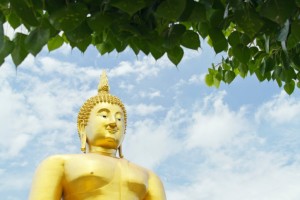
Buddhists may not recognize one of the traditional Western celebrations of winter such as Christmas, Hanukkah, Kwanza, or Saturnalia, but that doesn’t mean the religion doesn’t have its own seasonal festival. December 8 recognizes the day when Siddhartha Gautama experienced the enlightenment that transformed him into the Buddha.
What Was the Great Enlightenment?
Although the historic traditions vary, most agree that Siddhartha made the vow to find the root of suffering. After trying many other paths that didn’t work, he sat under a peepal tree, which is known as a ficus or Bodhi, and meditated. He spent 49 days under the tree, but it was the last eight days of his seclusion where he went into deep mediation in which he achieved his enlightenment. It was during this enlightenment when he discovered the Law of Karma, the Four Noble Truths, and Nirvana. After this, he became a Buddha.
Celebrating Bodhi Day
Bodhi Day is recognized in Zen and Pure Land Buddhist schools in Vietnam, China, Korea, and Japan. It is also known by other names, Rohatsu and Shaka-Jōdō-e. December 8 is a day for meditation and remembrance. Symbols of the meaning of Buddhism are placed around the home to make the family mindful of this day.
Colored lights are strung up to symbolize the different pathways toward enlightenment. Along with candles, these lights are lit up on December 8 and every night for 30 more days. Some homes decorate a Bo tree, the ficus religiosa or ficus benjamina, with lights, beads, and three bulbs. The beads are a symbol of the unification of all things. The ornaments represent:
- The Buddha
- The Dharma – teachings of the Buddha
- The Sangha – the community of Buddhists
According to tradition, on the eighth morning of his meditation, Siddhartha was offered rice and milk to regain his strength. Many Buddhists start December 8 with this meal as a reminder to meditate and remember their heritage. Heart-shaped cookies are baked as symbols of the ficus leaves. The day may include the study of the Dharma or reading of Buddhist texts. Performing acts of kindness is another part of the season as well as a part of the Buddhist mindset.
Practice Mindfulness
Mindfulness is one of the key philosophies in Buddhism. Jon Kabat-Zinn, the founder of the Mindfulness-Based Stress Reduction program at the University of Massachusetts Medical Center, defines it as “paying attention in a particular way; On purpose, in the present moment, and nonjudgmentally.” One way to practice mindfulness is to slow down and notice your attitude. Be aware of what is happening around you. Don’t let your mind wander when you’re performing your daily routine. Try to notice each part of the experience without thinking about it. On Bodhi Day, take the time to be mindful about what is going on in your life, in the moment, as it happens.
Not a Widely Held Celebration, Good to Remember
Bodhi Day is not celebrated as much as Wesak Day, which commemorates the birth and death of Gautama Buddha. Siddhartha Gautama is not the only Buddha recognized in Buddhist traditions. Wesak Day is often considered the birth of Buddhism, and it is celebrated in the spring.
Bodhi Day is a winter holiday where Buddhists can remember their heritage and enjoy family and friends. Some Buddhists retake their vows on this day. Many families retell the stories of the Buddha to their children while baking and eating cookies on December 8. As you can see, many of the festivities are not much different than other holiday celebrations. Lights and candles, telling stories, enjoying family and friends are all part of the season. No matter what your religion, it comes down to remembering your heritage and coming together for fellowship and food.

